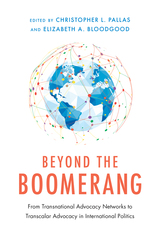
Margaret E. Keck and Kathryn Sikkink introduced the boomerang theory in their 1998 book, Activists beyond Borders: Advocacy Networks in International Politics. It remains one of the first broadly applicable theories for why groups of NGOs and interested individuals form transnational advocacy networks. Since its publication, however, the empirical conditions that prompted their theory have changed. The types of actors involved in transnational advocacy have diversified. Northern NGOs have lost power and influence and have been restricted in their access to southern states. Southern NGOs have developed the capacity to undertake advocacy on their own and often built closer relationships with their own governments. The architecture of global governance has likewise changed, providing new avenues of access and influence for southern voices.
In Beyond the Boomerang: From Transnational Advocacy Networks to Transcalar Advocacy in International Politics, editors Christopher L. Pallas and Elizabeth A. Bloodgood offer cutting-edge scholarship that synthesizes a new theoretical framework to develop a coherent, integrated picture of the current dynamics in global advocacy. This new theory of transcalar advocacy focuses on advocacy activities and policy impacts that transcend different levels or scales of political action. In transcalar advocacy, all NGOs–northern and southern–are treated as strategic actors, choosing the targets, scales of advocacy, and partnerships that best suit their capacities and goals. The case studies in the volume develop the empirical grounding of this theory using data from Latin America, Africa, Europe, and Asia, with several chapters featuring cross-national comparison. The chapters highlight the wide variety of actors involved in advocacy work, including NGOs, social movements, international institutions, governments, and businesses. Contributors use both qualitative and quantitative methodologies and bring to bear insights from political science, international relations, and sociology. The case studies also include diverse issue areas, from women’s rights to environmental protection, sustainable agriculture, health policy, and democracy promotion.
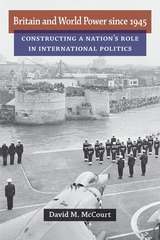
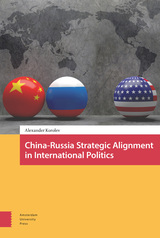
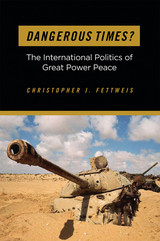
What horrors will the twenty-first century bring? For many people, a clash of civilizations and a perilous return to great power rivalries are the dominant visions of things to come. Fueled by daily headlines, overwhelming majorities of people from all walks of life consider the world to be a far more chaotic, frightening, and ultimately more dangerous place than ever before. Christopher J. Fettweis argues that these impressions, however widespread, are wrong.
Dangerous Times? is an examination of international politics that reveals both theoretical logic and empirical data that support the vision of a future where wars between great powers are unlikely and transnational threats can be contained. Despite popular perception, today a far greater percentage of the world’s population lives in peace than at any time in history, and the number and intensity of all types of warfare have dropped steadily since the early 1990s. Terrorism, though reprehensible, can be combated and can actually increase international cooperation among states fighting a common threat. World wars like those of the twentieth century—the true clash of civilizations—are unlikely to be repeated in the close-knit world of the twenty-first century.
In this sharp and insightful book, Fettweis discusses this revolution in human history and its ramifications for international relations theory. He suggests a new vision for a more restrained U.S. grand strategy and foreign policy and reveals how, despite pessimistic perceptions to the contrary, the world is more likely entering a golden age of peace and security.
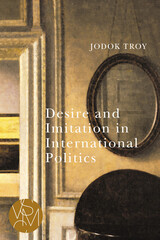

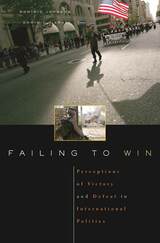
How do people decide which country came out ahead in a war or a crisis? Why, for instance, was the Mayaguez Incident in May 1975--where 41 U.S. soldiers were killed and dozens more wounded in a botched hostage rescue mission--perceived as a triumph and the 1992-94 U.S. humanitarian intervention in Somalia, which saved thousands of lives, viewed as a disaster? In Failing to Win, Dominic Johnson and Dominic Tierney dissect the psychological factors that predispose leaders, media, and the public to perceive outcomes as victories or defeats--often creating wide gaps between perceptions and reality.
To make their case, Johnson and Tierney employ two frameworks: "Scorekeeping," which focuses on actual material gains and losses; and "Match-fixing," where evaluations become skewed by mindsets, symbolic events, and media and elite spin. In case studies ranging from the 1962 Cuban Missile Crisis and the current War on Terror, the authors show that much of what we accept about international politics and world history is not what it seems--and why, in a time when citizens offer or withdraw support based on an imagined view of the outcome rather than the result on the ground, perceptions of success or failure can shape the results of wars, the fate of leaders, and the "lessons" we draw from history.

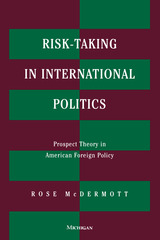
Rose McDermott applies prospect theory, a theory developed by psychologists to understand decisionmaking under conditions of risk, to four cases in American foreign policy. Prospect theory suggests that decisionmakers who are confronting losses are more likely to take risks than are those decisionmakers who are satisfied with the status quo. The cases used to demonstrate this dynamic include: the Suez Crisis, the U-2 affair, the decisions surrounding the admission of the Shah of Iran to the United States in 1979, and the attempted rescue of the American hostages in Iran in 1980. McDermott shows how prospect theory enables us to understand cases that are otherwise inexplicable.
Risk Taking in International Relations offers a unique application of a sophisticated psychological model to international relations theory. The book will be of interest to political scientists and psychologists interested in decision making, in international relations and in American foreign policy.
Rose McDermott is Assistant Professor of Political Science, Cornell University.
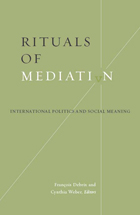

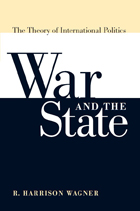
War and the State exposes the invalid arguments employed in the unproductive debate about Realism among international relations scholars, as well as the common fallacy of sharply distinguishing between conflict among states and conflict within them. As R. Harrison Wagner demonstrates, any understanding of international politics must be part of a more general study of the relationship between political order and organized violence everywhere--as it was in the intellectual tradition from which modern-day Realism was derived. War and the State draws on the insights from Wagner's distinguished career to create an elegantly crafted essay accessible to both students and scholars.
"Possibly the most important book on international relations theory since Kenneth Waltz's Theory of International Politics."
---James Fearon, Stanford University
"This is one of the best books on international relations theory I have read in a very long time. It is required reading for any student of modern IR theory. Once again, Wagner has shown himself to be one of the clearest thinkers in the field today."
---Robert Powell, Robson Professor of Political Science, University of California, Berkeley
"Painting on a vast canvas, and tackling and integrating topics such as state formation, domestic politics, and international conflict, R. Harrison Wagner's War and the State offers many brilliant insights into the nature of international relations and international conflict. War and the State compellingly highlights the importance of constructing rigorous and valid theorizing and sets a high standard for all students of international relations. The field has much to gain if scholars follow the trail blazed by Wagner in this book."
---Hein Goemans, University of Rochester
R. Harrison Wagner is Professor of Government at the University of Texas.
READERS
Browse our collection.
PUBLISHERS
See BiblioVault's publisher services.
STUDENT SERVICES
Files for college accessibility offices.
UChicago Accessibility Resources
home | accessibility | search | about | contact us
BiblioVault ® 2001 - 2024
The University of Chicago Press









